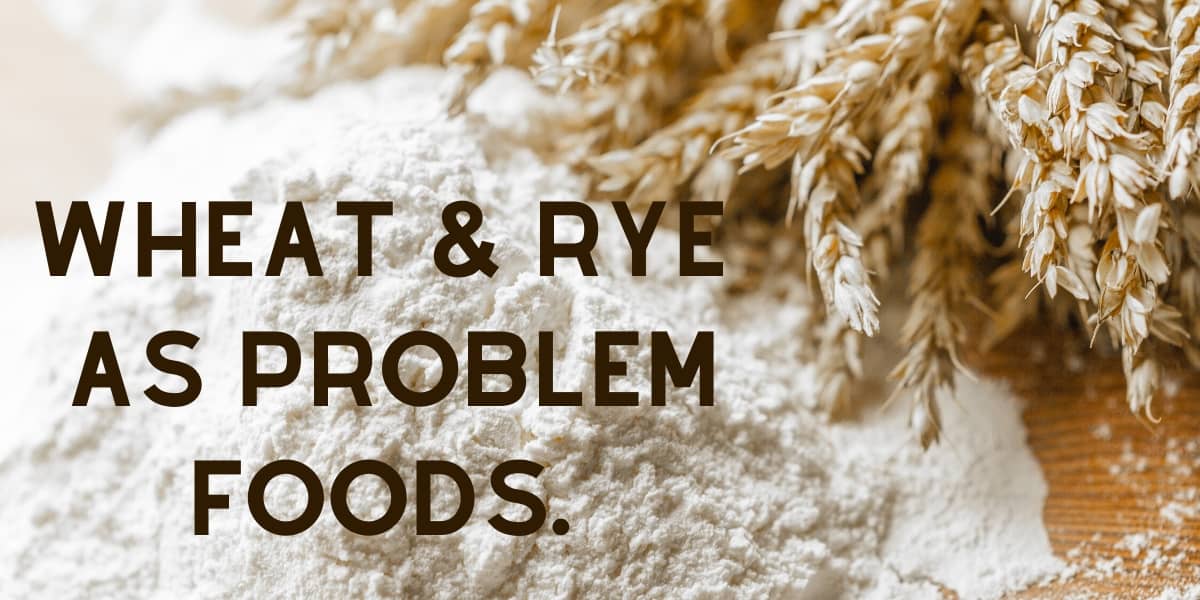Wheat & Rye as Problem Foods
In general, foods, which come from plants, have nothing like the suppressive action of animal foods. A great many plant foods, quite apart from the fruits, are among the most helpful active eliminators. However, in wheat and rye, we do have two plant-derived foods which are distinctly unhelpful to elimination. Wheat is the major staple in the Western-type diet.
Wheat problems
Conventionalists often speak of the advantages which wheat has given to the western world. In doing so they appear to see no further than just the protein content of wheat, which is higher than that of rice - a staple of the East. They even make no allowance at all for the superior quality of the protein of rice - which is a very important conventional difference, let alone showing any understanding at all about eliminative properties. The disadvantages of wheat are listed below.
- In common with the animal foods, wheat has some acid-forming properties, ie it tends to make the tissues acidic which depresses their elimination by a direct effect.
- As a consequence of 1), the sodium and potassium balance of the cells is upset and the entry of sodium is favoured. This has many adverse repercussions and the overall result is further depression of elimination.
- The principal protein of wheat seed is wheat gluten, which is a very unfavourable protein. It is very hard to digest fully and hence if the person's digestive system is working less than 100 percent, some of it usually escapes digestion.
- Partly digested wheat protein absorbed from the intestine has particularly bad effects. If it reaches the cells of the immune system, it elicits an allergy to wheat very readily which can produce numerous symptoms from depression to joint pains, but especially gastro-intestinal and mental/emotional problems.
- An allergy to wheat often brings in its wake a great proneness to allergy to other foods and non-foods as well. Hence, wheat of any kind in any product, bread, biscuits etc, and whether white flour or wholemeal, is an especially important contributor to syndromes of multiple allergies or the hyper-allergic condition which is rife these days and really very serious. The immune system, already weakened in this process, nearly always deteriorates further through the weakening action of unavoidable continuous reactions.
- As indicated above, wheat protein is of very poor quality and contributes less to our protein nutrition than most other protein sources.
- Wheat gluten, when it reaches the lower intestine in a nearly undigested condition, often forms an adherent layer covering the intestinal walls. This effect is aided by the presence of milk, meat and unhealthy mucus. The effects of this are:
- The adherent layer inhibits both the absorption of nutrients and the secretion of digestive juices into the lumen. Therefore, at one and the same time the processes of digestion are further downgraded, being subject to this interference. Also, the intestinal wall, and the body as a whole, is being partly denied access to the products of digestion.
- The adherent layer often becomes thick and heavy, inhibiting or preventing the muscular action of the intestinal wall and leading to intestinal stasis.
- The unfriendly non-lactosefermenting bacteria can multiply without much restraint within the adherent proteinaceous material, leading to putrefaction and a state of high toxicity. Hence, the body absorbs toxins in great quantity, putting an impossible load on the liver and causing 'autointoxication'
8. Wheat consumption has a major inhibitory effect, or blocking action, upon the eliminative function of the liver. Given the key central role of the liver in the elimination of toxins to the outside, this can result in a crucial disability. Whether this action is by a direct effect of wheat upon the liver, or indirectly, through promoting autointoxication, is not entirely clear.
Therefore, we can see that the overall effects of taking wheat in any quantity into a less thanperfect system will be quite disadvantageous. It takes a strong and uncompromised system to handle wheat without harm.
Rye problems
The effects from rye, which was also mentioned above, are far less than those from wheat because rye lacks gluten with comparable properties to wheat gluten. The effects on elimination from rye are also inclined to be adverse, but the reasons why this is so are mainly related to the acidity which rye produces (an effect as noted in 1.) above for wheat).

